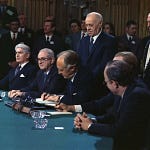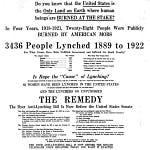This Day in Legal History: James Earl Ray Sentenced
On March 10, 1969, James Earl Ray was sentenced to 99 years in prison for the assassination of Dr. Martin Luther King, Jr. Ray had pleaded guilty to avoid the death penalty but later recanted, claiming he was coerced into confessing. His conviction came just under a year after King was fatally shot on April 4, 1968, at the Lorraine Motel in Memphis, Tennessee. The murder of King, a pivotal leader in the civil rights movement, sent shockwaves through the nation and intensified calls for racial justice. Ray’s arrest in London after a two-month international manhunt led to one of the most scrutinized legal proceedings of the era. Despite his guilty plea, Ray repeatedly sought a retrial, arguing that he was a scapegoat in a broader conspiracy. His appeals were unsuccessful, and he remained imprisoned until his death in 1998.
The King family later advocated for reopening the case, believing the government and other entities were involved in the assassination. In 1999, a civil jury in Memphis ruled in favor of the King family, concluding that the assassination was the result of a conspiracy, not the actions of a lone gunman. This verdict fueled ongoing debates about the true circumstances of King’s death and the extent of Ray’s role. The case remains one of the most controversial in American history, with lingering questions about the extent of government involvement. The King family’s pursuit of the truth highlighted their belief that justice had not been fully served. While the official record still names Ray as the assassin, many continue to question whether he acted alone or was merely a pawn in a larger scheme.
A Baltimore judge ruled that Adnan Syed, the subject of the popular Serial podcast, will remain free after reducing his life sentence to time served. Despite this decision, his 2000 murder conviction for the death of his ex-girlfriend, Hae Min Lee, remains intact. Judge Jennifer Schiffer stated that Syed is no longer a threat to public safety and that his continued freedom serves the interests of justice.
Syed was originally convicted by a state jury, but his case gained national attention due to concerns over trial errors and potential prosecutorial misconduct. He was released from prison in 2022 after prosecutors questioned the integrity of his conviction, though an appeals court later reinstated it. The ruling ensures he will not return to prison, though legal battles over his conviction continue. His case has fueled ongoing debates about wrongful convictions and the role of media in influencing the justice system.
Adnan Syed of 'Serial' Podcast Will Remain Free, Judge Rules (1)
The Trump administration fired Adam Cohen, the head of the Justice Department’s Organized Crime Drug Enforcement Task Forces, as part of a broader effort to remove career officials. Cohen, who had just helped draft a memo expanding the task force’s role in immigration enforcement, said he was shocked by the decision and insisted his work had been apolitical. His dismissal follows other high-profile removals, including three assistant U.S. attorneys in New York, two of whom prosecuted a corruption case against Mayor Eric Adams.
The attorneys were placed on administrative leave after Justice Department officials resigned in protest over pressure to drop the Adams case. Additionally, Liz Oyer, the Justice Department’s pardon attorney, and Bobak Talebian, who handled Freedom of Information Act requests, were also dismissed. The shake-up reflects a broader effort to reshape the Justice Department under Trump’s leadership, sparking concerns over political interference in law enforcement.
Trump Justice Department fires head of organized crime drug task force | Reuters
U.S. immigration agents arrested Mahmoud Khalil, a Palestinian graduate student at Columbia University, as part of President Trump’s crackdown on certain anti-Israel activists. Khalil, a U.S. green card holder, had been active in pro-Palestinian protests and served as a negotiator with university officials. The Department of Homeland Security accused him of leading “activities aligned to Hamas” but did not provide details or charge him with a crime. His arrest was widely condemned by civil rights groups as an attack on free speech.
The Trump administration also revoked $400 million in government contracts with Columbia, citing antisemitic harassment on campus. Critics argue the move is part of a broader effort to target higher education institutions and suppress pro-Palestinian activism. Khalil, who was detained at an ICE facility, had previously expressed concerns about being targeted for speaking to the media. His case has sparked legal challenges and heightened tensions over immigration enforcement and academic freedom.













